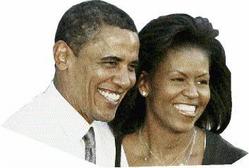
Wendel Abel - I AM WHAT I THINK
This article was written before the US election results. But, I have long assumed that Senator Barack Obama would have won the elections.
This was the most widely watched and scrutinised US election. It is certainly of historic significance to black people not only in the United States but worldwide. A black man would have ascended to the most powerful office in the world.
Why is this so important to black people? It is of importance because this, in a sense, is another redemptive moment for us. Slavery devalued, demeaned and denigrated black people physically and psychologically. We have always had to work twice as hard to achieve half as much as other 'privileged' groups.
The fact that Barack Obama became a major contender for presidency in this election was a great victory for black people. We celebrate this because it establishes what is possible and generated the hope that a black boy in the projects of Chicago, or a back girl from Harlem, can aspire to the highest office in the US.
Being black in Baltimore
This is also of personal significance to me as a black male. I studied in Baltimore, USA, at the John Hopkins University. That, for me, was a life-altering experience. I will be forever grateful to the people of the United States for having accorded me a scholarship and the opportunity to further my education. I met and made many friends, both black and white. They were all kind and gracious. But, I realised that slavery had left behind an institutional legacy that will take a long time to be erased.
The day I arrived at the airport in Baltimore, I was stopped four times by the US police after clearing immigration and customs. This was within eyeshot of my student adviser, who had come to the airport to meet me. She was surprised at the police's behaviour towards me. Recently, I had occasion to speak with her and, although the incident occurred 17 years ago, she brought it up in our conversation as she too was disturbed by my experience and got a glimpse into the daily experience of black people, especially black males, in many parts of the world.
One day, I went to the supermarket and realised that while shopping a store attendant was trailing me. The assumption was that I was a potential shoplifter. That was a very demoralising and degrading experience for me. Here I was, a highly-respected doctor from Jamaica and yet made to feel like a thief.
On another Sunday, I was on my way from church and I passed the same supermarket. An elderly black woman, about 80 years old beckoned to me. Tears were in her eyes. She told me she had gone to the same supermarket and an attendant in the supermarket, spat at her and called her nigger. The tears rolled down her face as she recounted the story. The humiliation, the disgrace and the devaluation. I could empathise with her. That morning, I took a decision I could not live through all of this and so, as soon as my period of study ended, I returned to Jamaica.
Everyday in Baltimore reminded me of being black and of the plight of black people. I dreaded using the elevator in the apartment I lived as my presence made others feel uncomfortable. I have seen people run while I was walking on the streets as they suspected me to be a robber. The truth is there are more black men in prisons than there are in colleges in the US. So, the grim reality is that in the United States I was another statistic, another black man heading for prison and not one who was in college.
I have never entertained the thought of returning to the US to live. I had to protect my psyche. I have had no regrets about returning home. Yes, we do have our problems, the crime, the poverty and the social disorder, but it is better to be a big fish in a small pond where one feels valued and respected rather than a small fish in a big pond where one feels devalued and demeaned.
The black stereotypes

Democratic presidential candidate, Senator Barack Obama, and his wife Michelle embrace during a rally last Tuesday at Bicentennial Park in Miami.
- AP
I hope that despite the vitriol that was thrown at him, Obama will help to reshape the perception that some people still have of black people, especially black men. His mother and grandmother clearly socialised him well and he was spared many of the psychological scars that plague many black people, especially black males. The grim reality is that we often reinforce the stereotypes that people have of us because of our own dysfunction.
For Obama to have successfully contended the primary and the election speaks to his superb skills. He had an excellent organisational structure and he was surrounded by a great team that made a difference.
His win will no doubt place America in safe hands. His victory will no doubt rewrite the history of blacks. It is another chapter in our long fight against oppression, discrimination and prejudice. Long live the president and we wish him well and every success.
Dr Wendel Abel is a consultant psychiatrist and head, Section of Psychiatry, Dept. Of Community Health and Psychiatry, University of the West Indies. Email: yourhealth@gleanerjm.com.

